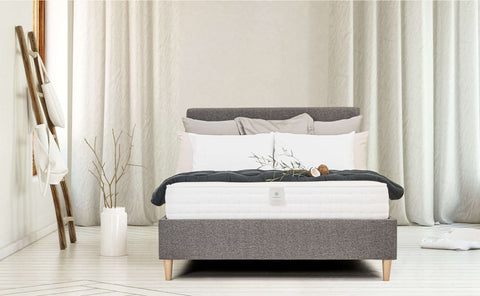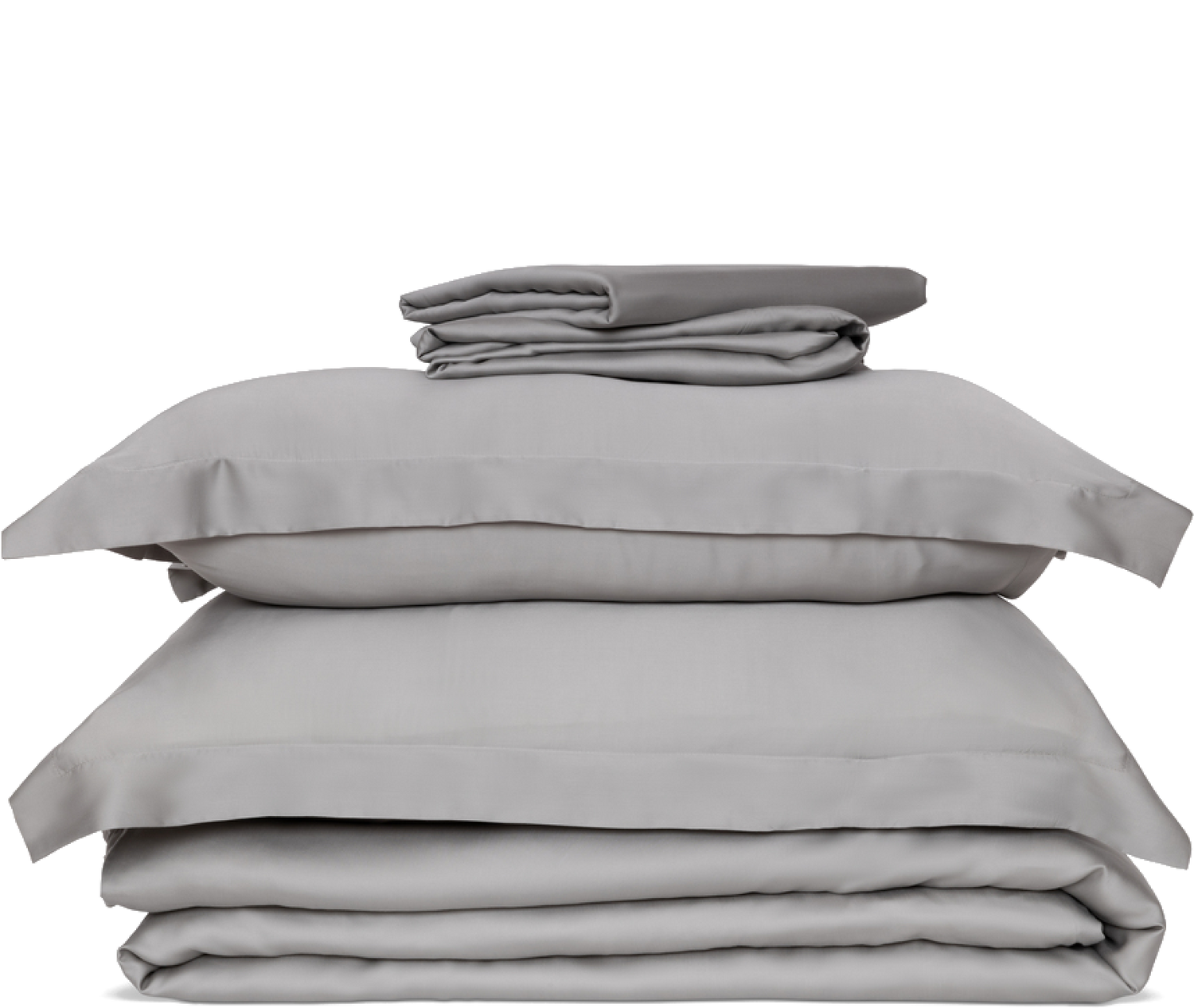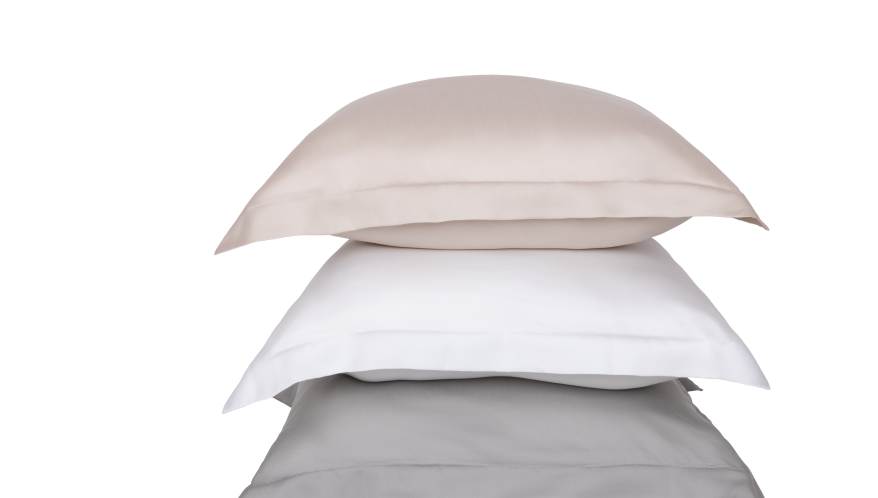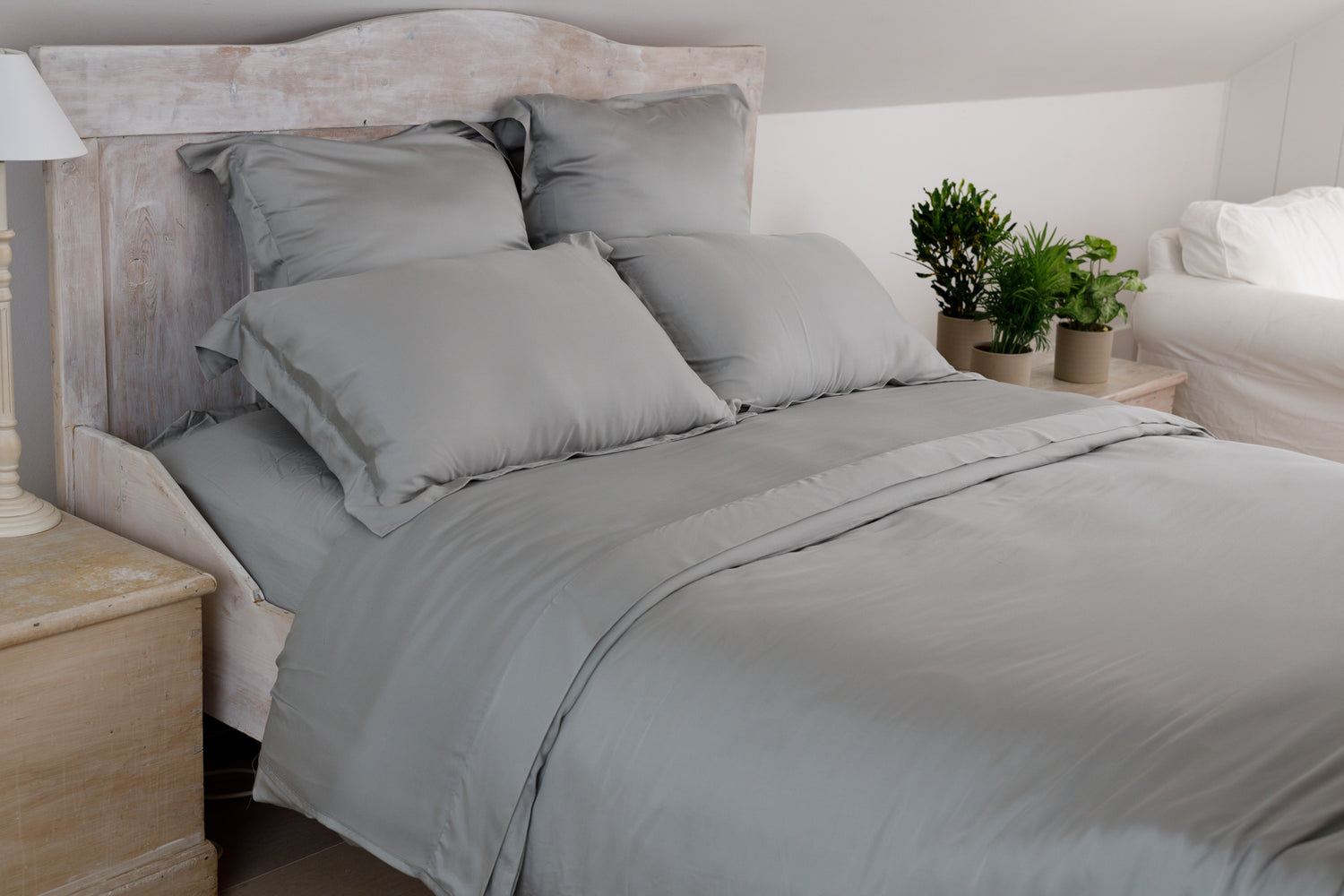Sensitive skin can be quite demanding and often requires special attention, especially if you suffer from conditions like eczema or dermatitis. However, did you know something as simple as your choice of bed sheets can actually have a positive impact on your health and wellbeing?
In fact, the right bed sheets not only enhance your overall sleep experience but can also contribute to healthier skin and hair. With that in mind, in this article, we'll guide you through the essential considerations to make when choosing the best bed sheets for sensitive skin.
What to look for when buying bed sheets for sensitive skin
When choosing bed sheets for sensitive skin, you’ll need to consider various factors, all of which can directly affect your comfort and skin health.
Material
The type of material your bed sheets are made of will play a pivotal role in how they interact with sensitive skin. Natural fibres like bamboo, eucalyptus silk, and cotton are excellent choices due to their breathability and hypoallergenic bedding properties.
Of course, it’s also important to pick sheets that offers silky elegance (anything too abrasive or rough can become scratchy and cause itchiness), with the above examples all getting softer over time.
Thread count
Thread count refers to the number of threads woven into one square inch of fabric. While a higher thread count is often associated with softer sheets, it's not necessarily the sole indicator of quality. For example, once you reach a certain thread count, the level of additional luxury is often indistinguishable – anything over 300 is typically considered to be high quality. If you’re interested in learning more, explore our guide to bedding thread counts.
Breathability
Another important factor to consider when browsing skin-friendly bedding is breathability. This relates to the ease of air circulation, which prevents night sweats – it’s particularly important for sensitive skin, as it can help to reduce irritation and allergies.
Certification
You should also look out for bedding that has credible certifications like OEKO-TEX. These accreditations are granted after rigorous product testing and ensure that the bed sheets and bedding are both free from harmful chemicals and produced following environmentally friendly practices.
Size
It might sound obvious but selecting the correct size bed sheets is essential for comfort, with ill-fitting sheets often quickly impacting sleep quality. To find out how big your sheets should be, accurately measure the dimensions of your mattress, including the depth, and account for mattress topper thickness (if applicable).

Shop Our Range Of Organic Eucalyptus Bedding
How to choose bed sheets when you have sensitive skin
Understanding your skin’s unique needs and sensitivities will make choosing the right bedding a breeze, so you can enjoy uninterrupted and comfortable sleep all night long. Tips for choosing the right bedding for your skin include:
- Identify specific sensitivities or allergies your skin may have. As well as being crucial for your overall health and wellbeing, understanding how your skin works will help you eliminate materials that may cause irritation.
- If possible, try to either obtain samples of the bedding materials you're considering (to test them on a small area of your sensitive skin), or visit an in-person store to experience each fabric and textile. This allows you to gauge immediate reactions and rule out specific products on the spot. Alternatively, if buying online, make sure to read plenty of reviews for each product, searching for those from similarly-sensitive customers.
- As well as choosing bedding that caters specifically to your sensitivity, it’s also worth considering classic factors like texture and feel. For example, while some people prefer the crispness of cotton, others enjoy the smoothness of eucalyptus silk.
The best sheet materials for sensitive skin
We’ve explored the various material considerations you should make when buying new bedding, but which fabrics are the best at catering to sensitive skin?
Cotton
One of the great benefits of cotton is its natural breathability and softness – often getting softer with each wash. With so many varieties to consider, from luxury Egyptian and Pima cotton to affordable Upland, you’re sure to find a textile that offers the texture and qualities that match your personal preferences.
When choosing cotton for sensitive skin, it’s often beneficial to opt for a high-quality weave with a thread count of 200-300 for enhanced breathability. As for cotton care, wash your sheets on a mild cycle using a hypoallergenic detergent – this helps maintain cotton’s skin-friendly properties.
Percale
Percale is a type of cotton weave known for its crisp texture, extreme durability, and cool breathability – all of which make it a good choice for sleepers with sensitive skin. If you’re planning on going down the percale route, we’d suggest looking for bedding with a thread count between 200-400 for peak comfort.
Bamboo
Bamboo sheets rank among the most luxurious on the market, with breathability, temperature regulation, and moisture-wicking properties just a few of the benefits of bamboo. Designed to prevent overheating at night, it’s the ideal choice for anyone whose skin is prone to irritation.
When choosing bamboo for sensitive skin, keep an eye out for organic solutions – those free of chemicals will be much better for your skin. And as with cotton, wash on a gentle cycle with a mild detergent to preserve the fabric’s delicate make-up.
Silk
Silk has earned itself a long-time reputation as being one of the best-quality fabrics, with its hypoallergenic luxury making it a top choice for sensitive skin. What’s more, its smooth texture reduces friction, minimising hair- and skin-irritation. Incidentally, the same can also be said for silk’s ethical cousin, eucalyptus silk, which is sourced from its namesake: the eucalyptus plant.
In fact, as well as boasting all the benefits of traditional silk, eucalyptus silk is becoming increasingly popular thanks to its environmentally-conscious and humane manufacturing process; unlike the original, eucalyptus silk doesn’t harm the precious silk worm, while it also requires 95% less water and 30% less energy to produce than cotton.

Reimagine Your Bedroom With our entire range of Organic Bedding
Why do bed sheets matter for sensitive skin?
It’s crucial to choose the right material and bedding texture, if you suffer from sensitive skin. Unsuitable bed sheets, pillowcases, and duvet covers can contribute to discomfort, including everyday irritation, exacerbated allergies, and worsened conditions.
Reduced irritation
Sleek and soft bed sheet materials like Egyptian cotton, bamboo, and eucalyptus silk minimise friction, which reduces the risk of skin irritation and rashes.
Temperature regulation
Opting for a breathable fabric helps to prevent nighttime overheating and sweats, which allows you to maintain a comfortable and cosy sleep environment. Natural textiles are usually more likely to be temperature regulating, while synthetics will often struggle with breathability.
Hypoallergenic
Naturally-occurring materials often possess hypoallergenic properties, which combat dust, mites, and mould - making them suitable for individuals with skin sensitivities. Particularly excellent examples include cotton, bamboo, and eucalyptus silk.
Moisture-wicking
Moisture-wicking properties found in naturally occurring fabrics like bamboo and eucalyptus silk help keep you comfortable all night long. Combined with effective temperature regulation, you can expect healthy and dry skin, even in the height of summer.
So, with that final point, you should now feel confident and comfortable finding the perfect bedding – no matter your skin sensitivities and allergies. From material selection to understanding your skin’s needs, each step and consideration will contribute to a healthier night’s sleep!
If you’re feeling inspired, why not check out our full range of luxury eucalyptus silk bedding? Alternatively, discover even more from our sleep experts over on the Ethical Bedding blog – including how to choose the best bedding for eczema.
FAQs
Why do my bed sheets irritate my skin?
There are a number of reasons for your skin to react negatively to your sheet material, with one of the most common causes being that you’re sleeping on synthetic bedding. The synthetic material traps heat and moisture, which can lead to discomfort.
In contrast, choosing natural, breathable, and hypoallergenic textiles like cotton, bamboo, or eucalyptus silk can help this issue.
If this isn’t the case and your sheets are manufactured from all-natural materials, it may be that you’re washing your bedding with a harsh detergent that includes chemicals prone to prompting irritation.
What is the best bedding material for itchy skin?
For itchy skin, the best bedding materials are those that are hypoallergenic, soft, and breathable. Excellent examples of natural fibres include Egyptian cotton, bamboo, and silk (including eucalyptus silk). On the flipside, synthetics like microfibre can worsen your sleeping comfort, because they’re more prone to holding in heat.
What is the best material for bed sheets for sensitive skin?
It’s difficult to crown a single best material for bed sheets for sensitive skin, because there are often a few factors in play, and each person’s individual preferences have to be taken into consideration.
However, generally, natural fibres are recommended. Egyptian cotton, bamboo, and eucalyptus silk are all favoured, thanks to their softness, hypoallergenic, breathability, and moisture-wicking properties, all of which minimise the risk of skin irritation and itchiness.









